| |
Prague - Old Town (Stare Mesto)
Old Town, the oldest of the various 'towns' that
compose Prague, is situated in a semicircular bend of the Vltava
River and, therefore,
ideally protected.
The beginnings of Old Town date back to the first millennium.
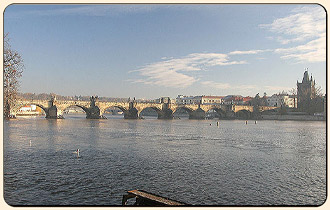
Charles Bridge Charles Bridge is one of the best-loved and most significant
structures in Prague, built during the reign of Charles IV.
The bridge spans the Vltava River, linking Old Town and the
Lesser Town.
From the bridge, there are marvelous views of
the Vltava river Valley, with its numerous bridges, the Zofin
and Strelecky Island, the Old Town and the Lesser Town, dominated
by Hradcany Castle. The bridge, supported by 16 piers, is
520 metres long and nearly 10 metres wide. Charles Bridge is
best-known
for its characteristic sculptural decoration. On each side
of the bridge, there are 15 statues. The most famous sculpture
is St. Jan Nepomucky.
|
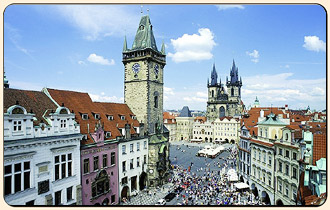
Old Town Square
The centre of the Old Town has always been the
Old Town Square dominated by the twin spires of the Church
of Our Lady of Tyn and the Town Hall of the Old Town. Old Town
Square represents the centre of Prague, even today.
The spacious square (9 000 square metres) was originally the
market place of the Old Town during the 11th and 12th centuries
and lay on the route of the traditional coronation procession
of Czech kings, from Vysehrad to Hradcany. The square has been
the scene of great events, both glorious and tragic.
|
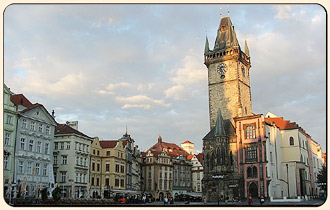
The Old Town Hall
Old Town gained the right to found its own Town Hall
from King John of Luxembourg, in 1338, after several previous
attempts. The Old Town Hall consists of a complex of several
buildings, standing above Early Gothic and partly Romanesque
foundations. The nucleus of the Town Hall was formed around
a house belonging to the Stein family, to which a square tower
was added in 1364.
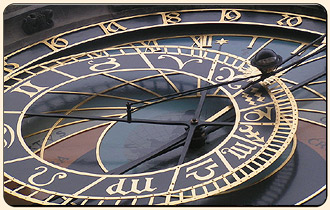
There is an astronomical clock in the tower. The clock was
originally installed in 1410, but in 1490, it was rebuilt by
the Master Hanus, of Charles University. The main attraction
is the procession of the 12 Apostles, which takes place every
hour on the hour. The figures of the Apostles were added in
the 17th century. |
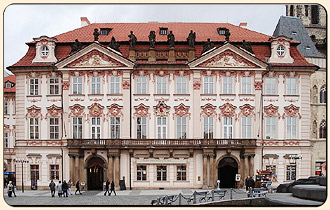
The Goltz-Kinsky Palace
This palace is the most beautiful Rococo building in Prague.
It was built in the years 1755-1765. In 1635, the original
buildings were owned by Count R. Kinsky. It was built by Anselmo
Lurago, after oldest plans by Kilian Ignaz Dientzenhofer and
is considered his masterpiece. The building once housed a German
grammar school, attended by Franz Kafka.
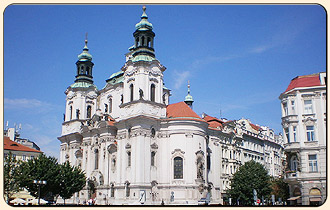
St. Nicholas Church in the Old Town
This Baroque Church, with its monumental south front, long
nave with side chapels and dome, was built by Kilian Ignaz
Dientzenhofer between 1732-1737, just along the border of the
former Jewish Town. |

The Church of Our Lady of Tyn Originally a Romanesque church and, later, early Gothic,
the church underwent a radical reconstruction in the last third
of the 14th century and early 15th century, in which Peter
Parler´s workshop participated. Its 80 metres high towers,
or spires, are emblematic of the whole city of Prague. |
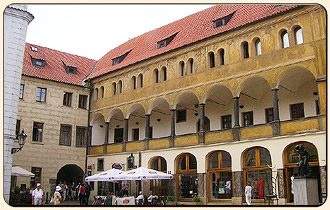
The Tyn Court - “Ungelt” The history of this enclosed court dates to the 11th century.
It was once a medieval trading centre and taxes were required
to be paid there. The name Ungelt reminds of the medieval function
of this placed called Tyn: foreign merchants visiting Prague
gathered here and, in earlier times, enjoyed the protection
of the sovereign in return for the payment of a fee (tax),
as goods were made, stored, bought and sold here. |
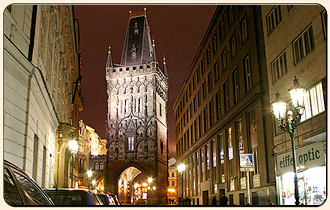
The Powder Tower The construction of this 65 metre high monument, one of the
most outstanding from the Late Gothic Period and the work of
the architect Matej Rejsek, was begun in 1475 in honor of King
Vladislav Jagiello. One of the most notable monuments on the
boundary of the old Town and New Town, the tower used to be
called the Kutnohorska tower, as it led to the silver mining
town Kutna Hora. The Tower served as a gunpowder storage site
at one time and a wooden bridge connected the gate with the
former Royal Court. Inside the tower, there are two richly
decorated halls. |
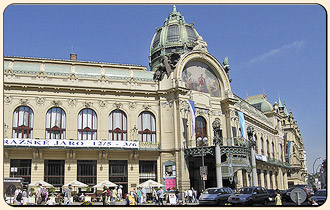
The Municipal House This cultural and social centre of Prague, a representative
Art Noveau building, was erected on the location of the former
Royal Court in 1906-1912. Its interior contains a Smetana concert
hall, a nice café in the ground floor, a restaurant,
a wine restaurant, ball-rooms and exhibition halls. On 28 October,
1918, the Czechoslovak Republic was proclaimed there and in
1989, the so-called round table discussion between the former
communist government and its opposition, under the leadership
of Vaclav Havel, took place there. |
The Jewish Quarter
The Jewish Quarter is a part of Prague's Old Town. The district
is also named Josefov after the emperor Josef II. The Jewish
town was added to Prague's historical center in 1850. Prague´s
Jewish community was one of the oldest in Europe. Prague's
Jewish population has lived in this area for centuries but
was nearly destroyed during World War II. Today, the Jewish
Museum consists of five synagogues, the Old Jewish Cemetery
and the Ceremonial Hall. See more about the Jewish
Quarter here.
|
|
|













